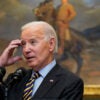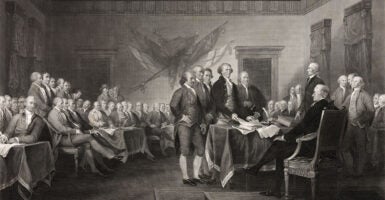Although some of America’s Founding Fathers were deists, rather than Christians, the United States owes a debt of gratitude to a Judeo-Christian moral framework that goes beyond mere deism—and the proof is in the Declaration of Independence itself.
Deism refers to the belief that God created the world and endowed human beings with reason, but after that, he left the world alone to develop naturally. Deists prefer a largely absent God who just set things in motion and then stands back, hoping everyone has a good time.
The Declaration of Independence does not envision such a God, and the document could not have formed the cornerstone of the American Revolution without a firm declaration that God—not government—is the foundation of just rule.
Here are the four times the Declaration mentions God:
1. The Laws of Nature and Nature’s God …
The very opening of the Declaration features a reference to God (bold emphasis added):
When in the Course of human events, it becomes necessary for one people to dissolve the political bands which have connected them with another, and to assume among the powers of the earth, the separate and equal station to which the Laws of Nature and of Nature’s God entitle them, a decent respect to the opinions of mankind requires that they should declare the causes which impel them to the separation.
The Declaration states that the God revealed in nature also gave a moral law between peoples, a law to which the American colonies appeal in their claim to have the right to become free and independent states. This moral lawgiver arguably goes beyond deism in stating a natural law that traces back to a divine lawgiver.
2. Endowed by Their Creator …
The Declaration roots unalienable rights not in reason but in God:
We hold these truths to be self-evident, that all men are created equal, that they are endowed by their Creator with certain unalienable Rights, that among these are Life, Liberty and the pursuit of Happiness.
According to the Declaration, the ultimate source of rights is not the government or the will of the people, but God.
3. The Supreme Judge of the World …
The Declaration of Independence does not just root unalienable rights in God; it also appeals to God as the ultimate judge determining the rightness of the colonists’ cause:
We, therefore, the Representatives of the United States of America, in General Congress Assembled, appealing to the Supreme Judge of the world for the rectitude of our intentions, do, in the Name, and by the Authority of the good People of these Colonies, solemnly publish and declare, That these United Colonies are, and of Right ought to be Free and Independent States;
This version of God is more than just an absent creator or a disembodied lawgiver; he also resolves disputes, and the newly independent Americans claim that he endorses the rightness of their cause.
This God of judgment aligns less with deism than theism, specifically Judaism, Christianity, and Islam. While some deists did believe in an afterlife, many did not.
4. The Protection of Divine Providence …
As if to banish any doubt that they did not have the deist version of God in mind, the authors of the Declaration of Independence state their belief that God is involved in the world:
And for the support of this Declaration, with a firm reliance on the protection of divine Providence, we mutually pledge to each other our Lives, our Fortunes, and our sacred Honor.
“Providence” refers to the idea that God provides for the world and its people. Christians believe that God upholds the entire universe, and the Declaration’s signers put their faith in God’s ability to protect them from the most powerful empire on earth at the time: the British. (After all, the British had just won a massive war, acquiring colonies across the globe and dismantling much of the French colonial empire at the time).
Although Thomas Jefferson notoriously tore up the New Testament, rejecting parts of the Bible he didn’t like, he nevertheless wrote a document that rejects the fundamental tenet of deism. The signers of the Declaration didn’t just root the rightness of their cause in God and his laws—they expressed their reliance on God’s involvement in the world and trusted that he would make them succeed in their cause.
Why Does It Matter?
The Declaration of Independence’s references to God matter for two reasons.
First, they illustrate a fundamental difference from the anti-religious and anti-clerical French Revolution, which threw out much of the Judeo-Christian tradition along with the monarchy. Unmoored, that revolution devoured its own, and France is currently on its fifth republic—which came after a republic, an empire, another monarchy, a separate monarchy, another republic, another empire, a third republic, a fourth republic, and the current republic that began in 1958.
Second, the Declaration’s references to God illustrate the Founders’ belief that religion actually bolstered liberty. As President John Adams wrote in his letter to the Massachusetts militia in 1798, “we have no government armed with power capable of contending with human passions unbridled by morality and religion.”
“Avarice, ambition, revenge, or gallantry, would break the strongest cords of our Constitution as a whale goes through a net,” Adams wrote. “Our Constitution was made only for a moral and religious people. It is wholly inadequate to the government of any other.”
As America becomes increasingly less religious, it has become more tribal as Americans fill the spiritual void with identity politics, making for a harsher public square. The Founders looked to faith as a bulwark of freedom, and rooted their arguments in God, not the right of one group over another.
America today could stand to learn from this example.































